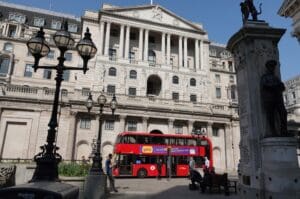The Bank of England is expected to reduce interest rates significantly faster than financial markets currently anticipate, according to new forecasts from Goldman Sachs.
The Wall Street investment bank projects that the UK’s base rate could drop to 2.75% by November 2025, driven by continued progress on disinflation and dovish signals from policymakers.
At present, the UK base rate stands at 5%, which Goldman Sachs described as “notably restrictive.” The investment bank’s researchers believe that the Bank of England will lower rates more aggressively than is priced in by markets, as inflation continues to ease. In contrast, market consensus suggests a slower decline, with rates expected to settle at around 3.5%.
Differing views on rate cuts
Goldman Sachs’ predictions align with those from Deutsche Bank, which also expects faster-than-anticipated cuts, albeit at a slower pace. Deutsche Bank forecasts the base rate to fall to 3% by February 2026. Meanwhile, financial markets currently expect two 25 basis point reductions by the Bank of England in November and December this year, bringing the base rate down to 4.5%.
The projections follow a faster-than-expected drop in UK inflation, which fell to an annual rate of 1.7% in September from 2.2% in August. This has raised expectations that the Bank of England will ease monetary policy, although views within the Bank’s Monetary Policy Committee (MPC) differ on how quickly to act.
Andrew Bailey, the Bank’s governor, has suggested the MPC could be more aggressive in lowering rates if inflation stabilises, while Huw Pill, the Bank’s chief economist, has favoured a more gradual approach. The panel’s upcoming discussions at the International Monetary Fund meetings in Washington are expected to offer further insights into the Bank’s strategy.
Balancing economic pressures
The challenge for policymakers is determining the “neutral interest rate”—the rate that neither stimulates nor constrains economic activity. Goldman Sachs estimates the UK’s neutral rate at 2.75%, up from the negative real-terms rates seen following the global financial crisis. After accounting for inflation, they estimate the real neutral interest rate to be around 0.8%, in line with historical averages.
However, determining this rate is complicated. The UK economy faces a unique mix of factors, including slow productivity growth, rising public debt, and an ageing population, all of which weigh on long-term economic potential. The country’s debt-to-GDP ratio has surged from 35% in 2007 to nearly 100%, its highest level since the 1960s, placing further pressure on the economy.
In addition, Chancellor Rachel Reeves is expected to increase borrowing in the upcoming Autumn Budget to fund public investment, a move analysts believe is unlikely to cause the kind of market instability triggered by former Prime Minister Liz Truss’s tax cuts last year. Reeves’ approach is expected to focus on investments that could boost long-term growth, rather than short-term fiscal giveaways.
Uncertainties around neutral interest rates
Central bankers often use estimates of the neutral interest rate to guide monetary policy, but these estimates are subject to significant uncertainty. A miscalculation could lead to rates that are either too high, constraining economic growth, or too low, stoking inflation. Goldman Sachs noted that while the Bank of England has indicated a neutral rate of around 2-2.5%, it remains cautious about placing too much weight on this estimate.
As the Bank of England navigates these uncertainties, the debate over how quickly to lower rates will be shaped by evolving economic data, particularly inflation trends and global economic conditions. With interest rates potentially falling as low as 2.75% next year, businesses and consumers alike will be watching closely to see how the Bank of England responds to the changing economic landscape.
Read more:
UK interest rates ‘could fall as low as 2.75% in the next year’, Goldman Sachs predicts
















